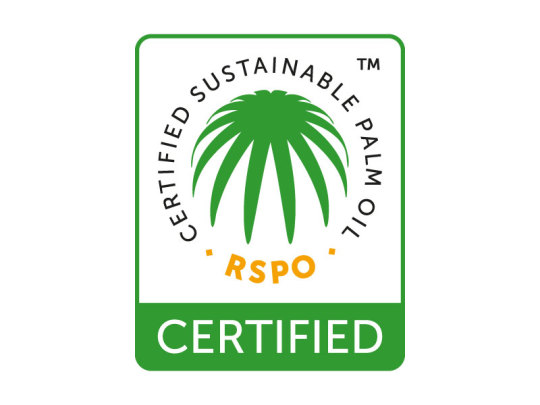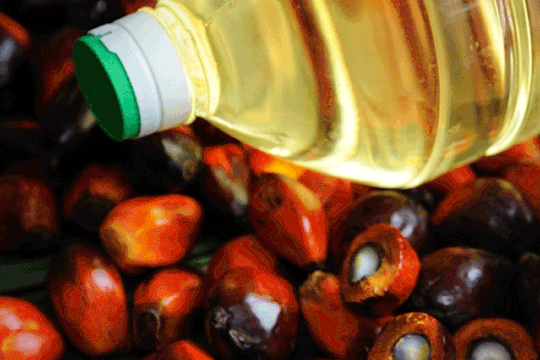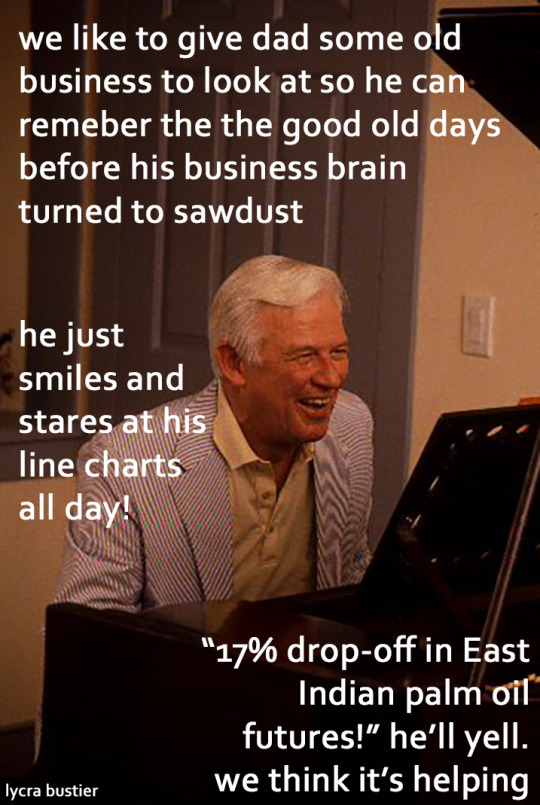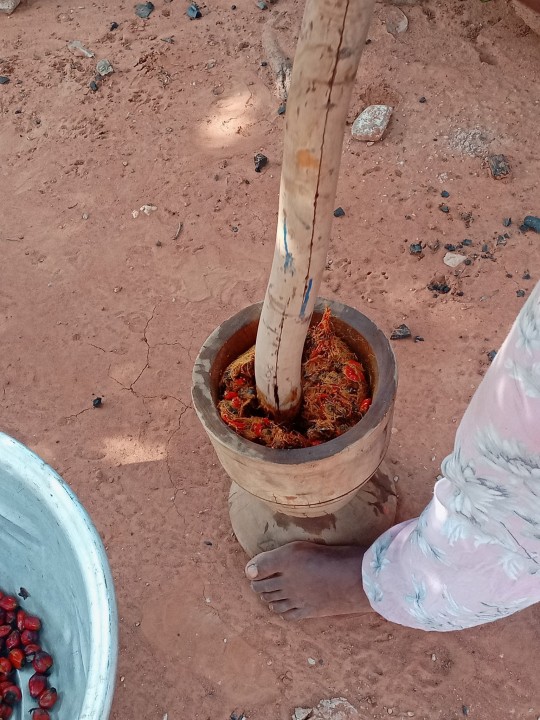#palm oil
Text
A Scottish research team believe they may have produced the "holy grail" alternative to palm oil.
It is estimated that almost half of all food and cosmetic products on supermarket shelves contain palm oil.
The huge demand has led to significant deforestation in areas where oil palm trees can grow near the equator.
Food experts at Queen Margaret University (QMU) in Edinburgh say their new 100% plant-based ingredient is 70% better for the environment.
And with 80% less saturated fat and 30% fewer calories, they are also hailing PALM-ALT as a significantly healthier option.
Catriona Liddle, one of the lead developers on the QMU team,
said: "It's the holy grail to replace it and still have exactly the same end result in product - to taste the same and have the texture the same - and we've done that.
Continue Reading.
692 notes
·
View notes
Text
As Marx instructed and Rosa Luxemburg affirmed, contrary to the rosy predictions of bourgeois political economists, capital’s response to falling prices and saturated markets is simply greater violence to find new vistas of accumulation. Empires compete to open new markets through imperialism, or go to war to annihilate people, or destroy over-accumulated wealth.
Max Haiven, Palm Oil: The Grease of Empire
153 notes
·
View notes
Text
Indonesia Says a Half Million Acres of Palm Plantations will be Turned Back into Forests https://www.goodnewsnetwork.org/indonesia-says-a-half-million-acres-of-palm-plantations-will-be-turned-back-into-forests/
#good news#science#environmentalism#nature#environment#palm oil#palm plantations#indonesia#forests#reforestation
185 notes
·
View notes
Text
"As countries around the world begin to either propose or enforce zero-deforestation regulations, companies are coming under growing pressure to prove that their products are free of deforestation. But this is often a far from straightforward process.
Take palm oil, for instance. Its journey from plantations, most likely in Indonesia or Malaysia, to store shelves in the form of shampoo, cookies or a plethora of other goods, is a long and convoluted one. In fact, the cooking oil or cosmetics we use might contain palm oil processed in several different mills, which in turn may have bought the raw palm fruit from several of the many thousands of plantations. For companies that use palm oil in their products, tracing and tracking its origins through these obscure supply chains is a tough task. Often it requires going all the way back to the plot level and checking for deforestation. However, these plots are scattered over vast areas across potentially millions of locations, with data being in various states of digitization and completeness...
Palmoil.io, a web-based monitoring platform that Bottrill launched, is attempting to help palm oil companies get around this hurdle. Its PlotCheck tool allows companies to upload plot boundaries and check for deforestation without any of the data being stored in their system. In the absence of an extensive global map of oil palm plots, the tool was developed to enable companies to prove compliance with regulations without having to publicly disclose detailed data on their plots. PlotCheck now spans 13 countries including Indonesia and Malaysia, and aims to include more in the coming months.
Palm oil production is a major driver of deforestation in Indonesia and Malaysia, although deforestation rates linked to it have declined in recent years. While efforts to trace illegally sourced palm oil have ramped up in recent years, tracing it back to the source continues to be a challenge owing to the complex supply chains involved.
Recent regulatory proposals have, however, made it imperative for companies to find a way to prove that their products are free of deforestation. Last June, the European Union passed legislation that prohibits companies from sourcing products, including palm oil, from land deforested after 2020. A similar law putting the onus on businesses to prove that their commodities weren’t produced on deforested land is also under discussion in the U.K. In the U.S., the U.S. Forest Bill aims to work toward a similar goal, while states like New York are also discussing legislation to discourage products produced on deforested land from being circulated in the markets there...
PlotCheck, which is now in its beta testing phase, allows users to input the plot data in the form of a shape file. Companies can get this data from palm oil producers. The plot data is then checked and analyzed with the aid of publicly available deforestation data, such as RADD (Radar for Detecting Deforestation) alerts that are based on data from the Sentinel-1 satellite network and from NASA’s Landsat satellites. The tool also uses data available on annual tree cover loss and greenhouse gas emission from plantations.
Following the analysis, the tool displays an interactive online map that indicates where deforestation has occurred within the plot boundaries. It also shows details on historical deforestation in the plot as well as data on nearby mills. If deforestation is detected, users have the option of requesting the team to cross-check the data and determine if it was indeed caused by oil palm cultivation, and not logging for artisanal mining or growing other crops. “You could then follow up with your supplier and say there is a potential red flag,” Bottrill said.
As he waits to receive feedback from users, Bottrill said he’s trying to determine how to better integrate PlotCheck into the workflow of companies that might use the tool. “How can we take this information, verify it quickly and turn it into a due diligence statement?” he said. “The output is going to be a statement, which companies can submit to authorities to prove that their shipment is deforestation-free.” ...
Will PlotCheck work seamlessly? That’s something Bottrill said he’s cautiously optimistic about. He said he’s aware of the potential challenges with regard to data security and privacy. However, he said, given how zero-deforestation legislation like that in the EU are unprecedented in their scope, companies will need to sit up and take action to monitor deforestation linked to their products.
“My perspective is we should use the great information produced by universities, research institutes, watchdog groups and other entities. Plus, open-source code allows us to do things quickly and pretty inexpensively,” he said. “So I am positive that it can be done.”"
-via Mongabay, January 26, 2024
--
Note: I know it's not "stop having palm oil plantations." (A plan I'm in support of...monocrop plantations are always bad, and if palm oil production continues, it would be much better to produce it using sustainable agroforestry techniques.)
However, this is seriously a potentially huge step/tool. Since the EU's deforestation regulations passed, along with other whole-supply-chain regulations, people have been really worried about how the heck we're going to enforce them. This is the sort of tool we need/need the industry to have to have a chance of genuinely making those regulations actually work. Which, if it does work, it could be huge.
It's also a great model for how to build supply chain monitoring for other supply chain regulations, like the EU's recent ban on companies destroying unsold clothes.
#deforestation#palm oil#indonesia#malaysia#agriculture#european union#united states#save the forest#open source#technology#mapping#forestry#satellite#good news#hope#climate solutions#environment
121 notes
·
View notes
Text
Palm Oil
The demand for Palm Oil in products has led to massive deforestation in Sumatra, Borneo and other Southeast Asian countries, leading to habitat loss for many species, ranging from tigers to numerous species of bat.
So what? You ask. It isn't like there's anything I can do about it.
Well, guess what, there is something you can do, and it doesn't involve a boycott.
Just look for this label on products containing palm oil:

image description: the RSPO certified symbol with a green palm and the words 'Certified sustainable palm oil' in black and 'RSPO' in orange around it
This symbol indicates that the palm oil used meets the sustainability standards of the Roundtable on Sustainable Palm Oil (RSPO).
Further Reading:
RSPO website: https://rspo.org/
Get involved as an Individual | RSPO: https://rspo.org/as-an-individual/
RSPO ScanApp (France only): https://rsposcanapp.com/
Products with RSPO Label | RSPO: https://rspo.org/as-an-organisation/our-trademark/products-with-rspo-label/
Palm Oil Scorecard | World Wildlife Fund: https://palmoilscorecard.panda.org/#/home
PalmOil Scan | Cheyenne Mountain Zoo and World Association of Zoos and Aquariums: https://www.waza.org/news/waza-palm-oil-scan-app/
29 notes
·
View notes
Text

To those who say there’s no connection between West Africa and ancient Egypt you may want to revise such notions.
The oil palm (Elaeis guineensis) is a native of West Africa. It flourishes in the humid tropics in groves of varying density, mainly in the coastal belt between 10 degrees north latitude and 10 degrees south latitude. It is also found up to 20 degrees south latitude in Central and East Africa and Madagascar in isolated localities with a suitable rainfall. It grows on relatively open ground and, therefore, originally spread along the banks of rivers and later on land cleared by humans for long-fallow cultivation (Hartley 1988: 5–7).

The palm fruit develops in dense bunches weighing 10 kilograms (kg) or more and containing more than a thousand individual fruits similar in size to a small plum. Palm oil is obtained from the flesh of the fruit and probably formed part of the food supply of the indigenous populations long before recorded history. It may also have been traded overland, since archaeological evidence indicates that palm oil was most likely available in ancient Egypt. The excavation of an early tomb at Abydos, dated to 3000 B.C., yielded “a mass of several Kilograms still in the shape of the vessel which contained it” (Friedel 1897).
A sample of the tomb material was submitted to careful chemical analysis and found to consist mainly of palmitic acid, glycerol in the combined and free state, and a mixture of azelaic and pimelic acids. The latter compounds are normal oxidation products of fatty acids, and the analyst concluded that the original material was probably palm oil, partly hydrolyzed and oxidized during its long storage.


#african#afrakan#kemetic dreams#africans#brownskin#afrakans#brown skin#african culture#afrakan spirituality#vodun#voodoo#palm oil#egyptian#egyptian art#egyptian gods#egyptian history#egyptian mythology#egyptian hieroglyphs#egyptology#archaeology#ancient#ancient egypt#kemet#ancient kemet#kemetic paganism#kemetic#kemetism#sons of kemet#kemeticism#bastet
22 notes
·
View notes
Text

if you go by business, pop-pop gets a spreadsheet?
#business#businesscore#business memes#office space#nostalgia#memes#vaporwave#retro#80s aesthetic#pianos#businessman#alzheimers#business brain#palm oil#old age#memory care
11 notes
·
View notes
Text
When the colonized world in Asia and Africa acquired independence between 1945 and 1960, Socfin managed to survive without taking a major hit.
But decolonization didn’t mean the end of foreign control of Indigenous land in the developing world; it just changed its shape.
Although many plantations in former colonies were expropriated and nationalized in the 1950s and ‘60s, soon afterwards, due to the legacy of decades of colonial rule and the subsequent lack of local expertise and capital needed to meet the requirements of the World Bank’s economic incentive programs, the newly independent governments drew on foreign capital to keep the businesses and exports running.
#palm oil#colonialism#imperialism#france#europe#capitalism#indonesia#belgium#climate and environment#racism
12 notes
·
View notes
Text

Tatale / Ghanaian Plantain Pancakes (Vegan)
#vegan#breakfast#street food#ghanaian cuisine#west african cuisine#african cuisine#pancakes#plantains#scotch bonnet peppers#cayenne#rice flour#palm oil#ginger#onion#sea salt#🤎
65 notes
·
View notes
Text
Palm oil season.



19 notes
·
View notes
Text
youtube
This lab in New York City is saving the rainforest! C16 Biosciences have created a truly sustainable alternative to Palm Oil using yeast! Palm oil is in 50% of supermarket products, from peanut butter to soap and snacks. And in order to harvest palm oil, humans have been destroying our rainforests to plant this mono crop, killing wildlife, creating slave-like working conditions and accelerating climate change. C16 Biosciences’ solution can be produced vertically in huge tanks, rather than horizontally across vital landscapes and ecosystems.
Learn more here: https://www.gopalmless.com
See more on Instagram-
/ goinggreenmedia
Join the Going Green Facebook Page-
/ ggreenmedia
Learn more about the Nick Maughan Foundation- https://nmf.org/
00:00-00:52 Intro
00:53-02:20 The Problem With Palm Oil
02:21-05:20 Inside The Lab
05:20-05:59 Torula Oil Uses
#Going Green#solarpunk#palm oil#Torula Oil#New York#new york city#USA#C16 Biosciences#yeast#palm oil industry#deforestation#Youtube
4 notes
·
View notes
Text
Songs about roadkill are often accompanied by other acts of commemoration that give forest creatures something akin to a peaceful afterlife after a harrowing and lonely death. The remains are wrapped in fronds, carried to nearby patches of forest, buried in the soil, and covered with offerings of leaves, sago flour, nuts and shoots. People regularly visit and pay their respects to roadkill as they travel a landscape dotted with makeshift burial grounds. They stop to sing new songs and leave small gifts. Often, they bring to the dead the silent companionship of yet another victim recently salvaged from the dusty road. A crushed black-crested bulbul, yellow-feathered and lighter than a betelnut, is laid beside the mangled casque of a cassowary, its feathers and claws stripped and sold by plantation workers. A mature wild boar joins them in the ground, its hair matted with clots of blood and froth. Then Marind sing for the animals’ children and grandchildren, both already-gone and never-to-come. In doing so, they grieve not only the deaths they witness in the present, but also the deaths they anticipate will occur in the near and distant future as oil palm plantations continue to expand relentlessly across their native lands and forests.
132 notes
·
View notes
Text
17 notes
·
View notes
Link
“The European Union has finalized a law that will ban the trade of commodities associated with deforestation and forest degradation.
On Dec. 6, the European Council, Parliament and Commission struck a preliminary deal to adopt the deforestation-free regulation, proposed by the European Commission in 2021. The Parliament and the Council will still have to formally approve the agreement.
Once adopted, the law will be the first of its kind in the world to tackle global deforestation by banning deforestation and forest degradation, regardless of whether it’s legal or not, from supply chains.
“The EU is a large consumer and trader of commodities that play a substantial part in deforestation — like beef, cocoa, soy and timber,” said Marian Jurečka, the environment minister of the Czech Republic, which negotiated on behalf of the 27 EU member countries.
The EU is responsible for 16% of tropical deforestation associated with international trade, second only to China.
“Protecting the environment around the world, including forests and rainforests, is a common goal for all countries and the EU is ready to take its responsibility,” Jurečka said.
Under the law, companies will be required to issue a due diligence statement verifying that goods they import into the EU market don’t come from deforested land and have not led to forest degradation anywhere in the world after Dec. 31, 2020. Operators and traders will also have to prove that the goods are legal by complying with all relevant applicable laws in force in the country of production.
The law covers commodities like palm oil, cattle, timber, coffee, cocoa, rubber and soy, as well as manufactured products like beef, chocolate, furniture and printed paper. The EU has identified these commodities as the main agricultural drivers of deforestation...
Some green groups have lauded the decision to adopt the law, with WWF [World Wildlife Fund] calling it “groundbreaking.”
“We have made history with this world-first law against deforestation,” said Anke Schulmeister-Oldenhove, senior forest policy officer at WWF’s European policy office. “As a major trading bloc, the EU will not only change the rules of the game for consumption within its borders, but will also create a big incentive for other countries fueling deforestation to change their policies.”
By requiring companies to invest in addressing deforestation and forest degradation in their supply chains as a requirement for access to the EU market, the law will raise the bar for the agricultural sector, according to Helen Bellfield, policy director at U.K.-based NGO Global Canopy.
“This is very welcome news for the world’s forests,” she said.” -via Mongabay, 12/7/22
#mongabay#mongabay environmental news#environmental news#conservation news#world wildlife fund#eu#european union#agriculture#deforestation#forest degradation#palm oil#beef#chocolate#coffee#good news#hope#conservation
46 notes
·
View notes
Text
"For thousands of years, those native to West Africa have cultivated the oil palm, deriving from it cooking and lighting oil, medicines, cosmetics, and much else. The 'ever-giving' oil palm remains central to the traditions and the culture of many from this part of the world. Nothing about the African oil palm, or the oil it exudes, demanded the emergence of a globalized, destructive, and profitable industry. It was the international slave trade, inaugurated by agents of European imperialism, that created a global market for palm oil.
At first, the oil fed enslaved Africans enduring the middle passage or greased their bodies to increase marketability. Yet throughout the nineteenth century, industrialists began relying on palm oil to lubricate railway locomotives, steamship engines, and the machines of newly thrumming factories.
Initially, British merchants purchased palm oil from a distance, relying on Africans themselves to extract the oil. Yet as European demand increased in the mid-nineteenth century, enterprising British colonizers began invading the African interior to seize direct control of palm oil production themselves. Backed by the capital of corporations — still fairly novel entities in the Victorian age, a 'strange legal fiction' created to 'facilitate the risky colonial and later slave-taking ventures of the rising European bourgeoisie' — palm oil merchants hired private militaries to confiscate lands and subdue their inhabitants. In 1897, the British launched a 'punitive expedition' to crush the Edo Kingdom, a powerful empire that considered palm oil to be a holy substance and therefore strictly regulated its trade — 'to the chagrin of British merchants.'
Those merchants (and their hired chemists) were learning how to bleach and deodorize palm oil, to drain it of any characteristic smell or color and thereby render it as maximally usable and minimally distinctive as possible. Palm oil became so profitable precisely because of this protean quality, and soon it was central to the creation of a range of cheap commercial goods like candles.
William Lever, a Liverpool industrialist, started using palm oil to produce bars of soap, and soon he had established massive oil palm plantations — another 'uniquely modern and fundamentally colonial' innovation — throughout the Congo. Counterintuitive though it may seem today, soap was not at the time an especially common consumer good, so Lever had to use advertising to create a market for his wares, adopting the language of personal responsibility to communicate to middle-class and later working women that the bars were needed amid increasing urban pollution.
Thanks far more to the advertising than to the quality of his soap or the efficiency of its production, Lever (and his eponymous company) grew rich. Today, his company — since renamed Unilever — remains 'one of the world’s single largest consumers of refined palm oil.'"
- Scott W. Stern, from "The Story of Palm Oil Is a Story About Capitalism." Jacobin, 19 January 2023.
#scott w. stern#max haiven#quote#quotations#palm oil#colonialism#imperialism#history#slavery#slave trade#worker exploitation#unilever#capitalism#commodification
18 notes
·
View notes
Text

Palm oil trees in Negeri Sembilan, Malaysia
Nazarizal Mohammad
2 notes
·
View notes